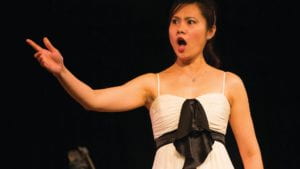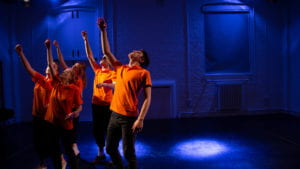Dr Pamela Karantonis is an academic in our Theatre and Performance department and teachers on our BA Drama: Musical Theatre course. This degree creates resourceful and well-informed performers, theatre-makers, administrators and teachers in the musical theatre industry.
Hi there! Could you tell us a little bit about yourself and your background?
I have a background as an opera chorister and soloist in Australia, performing in seven languages and many genres – my mentality is: why limit yourself? My PhD investigated impersonation, including some unusual and comic genres too. I think that musical theatre is an ever-evolving genre which is why I am drawn to it.
Please can you give us a quick overview of the degree course?
Even though o ur Programme is new and unique, we have built it based on a secure formula that maximises successful possible outcomes for well-rounded graduates facing the performing arts creative environments and industries. We blend training, critical thinking and entrepreneurship.
ur Programme is new and unique, we have built it based on a secure formula that maximises successful possible outcomes for well-rounded graduates facing the performing arts creative environments and industries. We blend training, critical thinking and entrepreneurship.
- Psychophysical and analytical training: In the first year you will acquire a grounding in the basic techniques and styles of musical theatre performance (voice, movement, acting, singing and dance) and an introduction to analytical methods of interpreting musical theatre texts and performances
- Practical and critical approaches to aesthetics of the genre: The second year builds on the foundations of the first, enabling you to learn strategies to work independently as a musical theatre-maker by utilising more advanced and detailed knowledge of the history and aesthetics of the genre, thereby enriching your deployment of key performance skills in producing pieces of musical theatre from the repertoire
- Entrepreneurship in the creative industries: The final year shows your how to conceptualise musical theatre in industrial and sociocultural terms. Through this, you will acquire a sophisticated perspective on the cultural industries that will motivate your independent and collaborative writing, devising and performance of musical theatre pieces designed to showcase the range of your artistic resources as a professional performer, theatre-maker, administrator or teacher.
What makes the Goldsmiths course distinctive?
Goldsmiths is a research-intensive University, where creative endeavours are underpinned by world-leading research. That means you will be studying among some pretty dynamic thinkers and we will encourage you to be one yourself! Our research publications see us as the internationally-recognised home of the British Musical and also published studies on Voice training. What this means in terms of Musical Theatre is that we are ambitious for our students to help to create the next big wave in the musical theatre landscape. We already have an established MA Programme in Musical Theatre, so we have pioneers to help you lead the way.
What are you looking for in an applicant? Do you have any tips for a great personal statement?
It is really important that you are true to your passions and be yourself. We are looking for people who are not afraid to say something original about why they love musical  theatre. It can be tempting to be hard on yourself and think that you have to be a perfect triple threat in a competitive environment or conform to a stereotype of a musical theatre performer. We do not have these expectations; rather a stereotype limits your creative possibilities. Just tell us the range of what you have experienced. We also want you to be open to learning, thinking, experimenting and working as a team.
theatre. It can be tempting to be hard on yourself and think that you have to be a perfect triple threat in a competitive environment or conform to a stereotype of a musical theatre performer. We do not have these expectations; rather a stereotype limits your creative possibilities. Just tell us the range of what you have experienced. We also want you to be open to learning, thinking, experimenting and working as a team.
How does this degree support students practically for life after university?
We start by building confidence in our students, through detailed and supportive skills training and a positive audition mentality, which helps with work opportunities upon graduation. We regularly invite in industry professionals with West End experience to host workshops and training events for the students. This not only helps to build skills but also practises networking skills. Moreover, as this degree is within an Arts and Humanities context, you will have all the invaluable advantages of a University education and the careers that can open up from that nurturance: to think progressively, creatively and dynamically for any opportunity your future may bring.
And finally…tell us a joke!
Well a musical theatre song is referred to as a “number”, so here we go with that theme (you probably need to say this aloud): “Why is 6 afraid of 7? Because 7, 8, 9.”